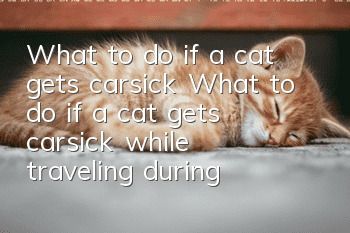What to do if a cat gets carsick? What to do if a cat gets carsick while traveling during the holidays?

What should I do if my cat gets motion sick? Every time when the holidays come, many cat owners will choose to take their cats on trips. After all, there is no one at home and they don’t want to leave their pets in the pet hospital!
Many animals get motion sickness, including dogs and cats. And motion sickness is a common problem for them. Of course, the problem of motion sickness generally occurs in domestic cats that rarely go out. So, if the owner wants to take the cat on a long trip, he should understand the symptoms of motion sickness in the cat and how to deal with it in advance.
1. What are the symptoms of motion sickness in cats
1. Frequently licking the upper lips to show a disgusted expression. Cat licking the upper lips is a common way to express excessive stress.
2. Vomiting, just like people, the stomach rolls up and down, and it is very likely that you can't hold it in and vomit after a turn.
3. Keep meowing or howling. This is the most common trick used by cats. If they are unhappy and uncomfortable, they will howl hard and ask to go home.
4. Drooling. Discomfort in the digestive system controlled by parasympathetic nerves can cause cats to drool.
5. Uneasiness or weakness may sound contradictory, but both of these situations may occur in a car-sick cat.
6. Diarrhea is also a symptom caused by digestive system discomfort.
If the cat shows the above symptoms while riding in a car or airplane, the owner should pay attention. In order for the cat to comfortably accompany the owner when traveling, the owner needs to do some homework in advance to reduce the cat's pain when going out.
2. Give you some practical methods
1. Fasting in advance. An empty stomach will help reduce your cat's nausea during car rides and may also reduce the need to use the toilet. For healthy cats, you can fast 6-12 hours in advance. For cats in poor health, fasting may be dangerous, so if the cat is ill before traveling, the owner must consult a doctor before deciding to fast.
2. Use flight boxes. In an unfamiliar environment, a relatively small and hidden space will bring a sense of security to the cat, and it will also be safer. Remember to put a thick blanket in the flight box to make your cat’s journey as comfortable as possible. Training cats to love the air box will bring great convenience to owners when they take their cats to medical appointments and travel.
What to do if your cat gets carsick? What to do if your cat gets carsick during the holidays
3. The taste of home. Carry an old T-shirt of yours or your cat’s favorite with youA blanket can soothe your cat. Try to keep your car as cool and quiet as possible.
4. A cat’s favorite toy. Keeping a cat’s favorite toy only for him to play with when traveling can help the cat establish a connection between travel and fun, making the cat’s journey no longer boring, and at the same time, it can also reduce the cat’s fear of long distances. The stress of traveling.
Feliway: A hormonal placebo that is effective for many cats and is often used to help cats become familiar with their new environment.
Herbal medicines and medicines to reduce the symptoms of motion sickness need to be used under the guidance of a veterinarian!
Drugs to reduce nausea symptoms: The active ingredient is Meclizine, such as Antivert, Bonine, Dramamin II, etc. But everyone should be aware that these drugs can only prevent vomiting and cannot reduce the cat’s anxiety.
Drugs that reduce anxiety: For example, Alprazolam. These drugs should be used with great caution and are only used in pets with severe anxiety. Therefore, it is best not to use this drug unless it is an emergency.
- How to train a Maine Coon cat to use the toilet
- How to stop cats from eating plants?
- Can cats spray toilet water on them?
- Can cats know their way home? How do cats find their way home?
- Why is the cat snoring?
- It’s OK to become addicted to petting cats. Parasites in cats are extremely harmful to humans and must be expelled on time!
- What does cat triplet mean?
- High temperature warning, how to properly cool down pets?
- Correct posture for holding a cat. Do you know the correct posture for holding a cat?
- Correctly understand the seriousness of feline infectious peritonitis



